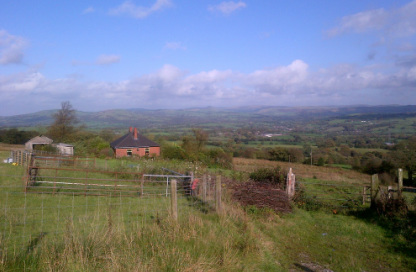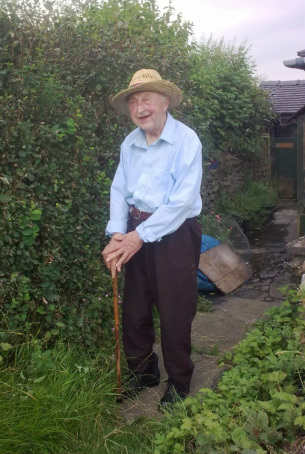|
There’s a place in Staffordshire where the road to Biddulph Moor turns in the direction of Leek, and dropping downhill the whole vast land of field and hedge and hill seems to open before you far into the distance where, almost imperceptibly, it meets the sky. It was here on a sunny Wednesday afternoon in September 2011 that I first met John Ivor Sutton.
I was on my way back from a rehearsal in Crewe, and was heading for Parwich in Derbyshire where I was teaching later that afternoon. I’d just crested the hill, and the lane curved down between steep grassy banks. As I negotiated a narrow bend I passed an old man in a blue gabardine raincoat hitching from the verge. I was driving slow enough to stop so I picked him up. He wanted to go to the co-op in Leek for his weekly shop. He began to talk the moment he’d settled into the car... So begins the memoir I’m writing of Ivor Sutton, who died on November 19th 2012, Meetings with Ivor. Last week we headed back over the hills into Staffordshire to take photographs of Ivor’s house, now empty. The weather has been windy and wet, but the sun appeared and the wild empty hills, trees softly brown and gold, lay under a silvery light. We wandered around the paddock, past the chicken coops, gazing into the empty room where he’d lived almost all his life. His furniture lay rotting outside, and one ornament – a porcelain couple painted in gaudy colours, had been placed on the glass cabinet where Ivor once crammed his many knick-knacks. We drove on to Horton Church of St Michael and All Angels, where we buried Ivor on 30th November, in the churchyard with its majestic views over the hills. Not far from Ivor’s grave with its simple wooden cross, I discovered the grave of his mother. Ursula Alice, beloved wife of Richard Sutton, Royal Shop Biddulph Moor, Died May 15th 1925 aged 28. Not our will o lord but thine. Alice died of puerperal fever a month after giving birth to Ivor – so he told me the day I met him – and his father disappeared, mad with grief. He was brought up by his grandparents, the Farrals – richest farmers in the Staffordshire Moorlands. Ivor haunts me still, old rogue that he was, in a benign but insistent way – demanding that I tell what I can of his story – that I don’t stop with a straightforward account of our meetings over the course of a year, but go further and find what I can about his mother, Alice, and his father – the waggoner, Richard Sutton, who was poor but had money enough to pay for Alice’s ornate marble headstone before disappearing for forty years. Surrounded as I am at the moment with old age and too much death, I’m aware of the fragility as well as the robustness of life – the traces we leave behind, for a brief moment, before they’re gone forever.
4 Comments
sylvia selzer
21/11/2013 12:21:11 am
Loved hearing you talk about Ivor. Looking forward to reading about him in the not too far distant future. He'd just waiting to leap off the page.
Reply
sylvia selzer
21/11/2013 12:22:57 am
Soz - typo. He's just waiting to leap off the page.
Reply
Karen
27/3/2015 07:22:47 am
I live in Biddulph Moor and remember Ivor cycling along the Top Road most days to the local shops. I had the privalige of meeting his several times and found him to be the perfect eccentric English gentleman. He was a well known character in the area and there are many stories about him which have been recounted to me.
Reply
Leave a Reply. |
AuthorTricia Durdey dances, writes, and teaches Pilates. Archives
October 2017
|


 RSS Feed
RSS Feed